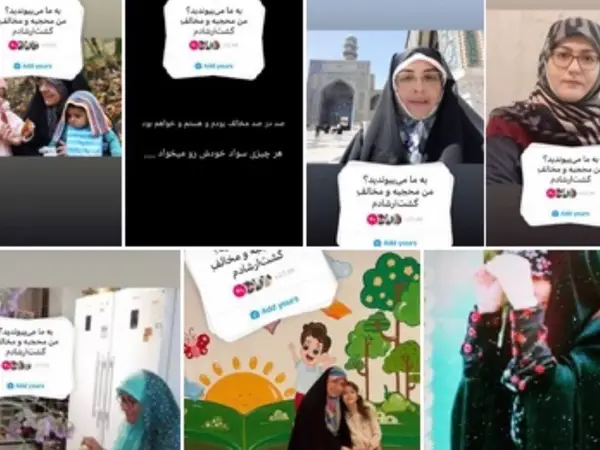Many Iranian women who wear the hijab by choice have joined a new social media campaign this week against Iran’s hijab enforcement street patrols.
The new campaign began with an Instagram story by reformist activist and sociologist Mohammad Reza Jalaeipur on July 20 when he urged religious women who wear the hijab by choice to oppose the government's pressure on other women to comply with forced hijab.
Jalaeipur’s story went viral and tens of thousands of hijab-wearing women either shared his story or posted their own pictures with the hashtag “I wear the hijab but am against morality police patrols”.
The campaign which is a separate initiative from the anti-hijab campaign launched earlier this month by women’s rights activists has angered many hardliners.
Meanwhile, in a statement Friday, fifteen prominent Iranian figures who are usually referred to as “religious intellectuals”, some of whom have a background in Shiite seminaries condemned the government policy of compulsory hijab and suppression of women.
They also urged religious scholars to display solidarity with Iranian women and condemn forced hijab and tools of suppression such as morality police’s hijab enforcement patrols.
However, hardliner clerics did not mince words in their Friday sermons, calling those who campaign for freedom of choice traitors.
Jalaeipur, a practicing Muslim, has long been speaking against the government's policy of forcing all women to abide by the prescribed hijab rules and argues that imposing these violates the rights of the majority citizens who are against compulsory hijab.
“When are you going to accept that the policy of compulsory hijab has failed and when exactly are you going to revise it?” Jalaeipur had challenged the authorities for a response in a Telegram post on June 27.
Iran’s government which is now fully controlled by hardliners has adopted a harsher than usual approach amid economic crisis and hardship for tens of millions. Government and military officials have warned the population a disobeying hijab rules and the morality police hijab enforcement patrols have detained many women, sometimes violently, on the streets.
The government also designated July 12 as the Hijab and Chastity Day this year and celebrated it with gatherings of women with full hijab at stadiums and other public venues.
Hundreds of thousands have supported the anti-hijab campaign on social media in the past few weeks. Many women have shot videos of themselves with uncovered hair in public places and posted the videos on social media with the ‘No2Hijab’ hashtag to display civil disobedience in reaction to the government’s harsh treatment of women for hijab.
Several activists have been arrested for their defiance of the hijab rules in July including Souri Babai-Chegini, a civil activist who published a video of herself removing her hijab, and Nazi Zandieh, a twenty-one-year-old student who also supported the anti-hijab campaign.
Officials usually insist that complying with hijab rules is “the demand of the majority of Iranians”.
Several surveys in the past few years, including a survey by Gamaan polling agency in the Netherlands, show that more than 50 percent of all Iranians and 75 percent of citizens in larger cities including the capital Tehran, oppose the compulsory hijab rules.
Results of surveys conducted by Iranian government agencies are usually not made public but according to Mehdi Nasiri, the former managing director of the hardline Kayhan newspaper, a survey carried out by the ministry of Islamic guidance in 2015 showed that more than 70 percent of Iranians did not agree with compulsory hijab.
